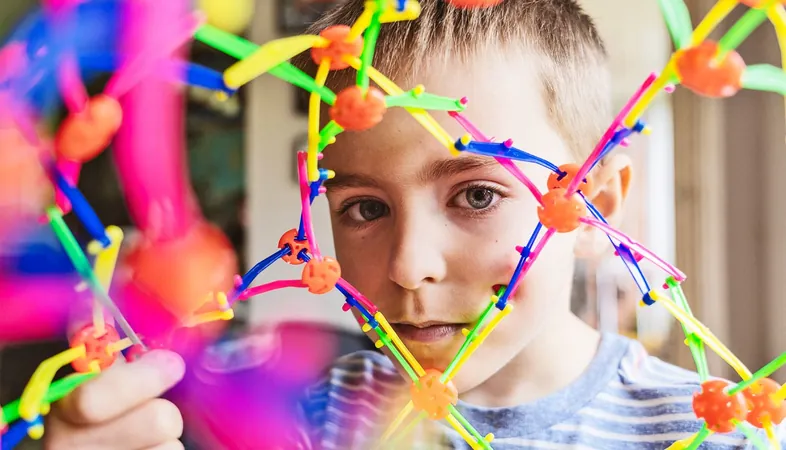
The Shocking Truth: How Tough Parenting Shapes Your Child's Brain for Life!
2024-11-07
Author: Sarah
Introduction
A groundbreaking new study reveals that the style of parenting—whether harsh or nurturing—during a child’s formative years can have a lasting impact on brain development and mental health during their teenage years and beyond. This research dives into how these early experiences can affect children, especially during high-stress periods like the COVID-19 pandemic.
Research Methodology
Using advanced statistical techniques, scientists investigated "sensitive periods" in childhood when the brain is most vulnerable to external influences, along with how these formative experiences can be linked to future mental health challenges. State-of-the-art brain imaging methods were employed to track how information is processed in the developing brain, providing unprecedented insights into the complex relationship between parenting and brain health.
Key Insights from Experts
According to Luke Hyde, a professor of psychology at the University of Michigan, "Understanding these sensitive periods can inform more effective policy and intervention strategies.” This insight emphasizes the urgency for parents and policymakers to consider when children are most receptive to positive influences.
Findings
The study's first author, graduate student Cleanthis Michael, points out that "our findings indicate that earlier interventions may offer broader benefits for brain development." This means that there’s a crucial window for parents to make a difference in their child's mental health trajectory.
Study Data
Data for this research came from an extensive 21-year longitudinal study tracking low-income families from Detroit, Chicago, and Toledo, Ohio, part of the Future of Families and Child Well-being Study. Over the years, researchers collected responses from 173 youths, starting from their early years in February 1998 up until June 2021.
Parenting Behaviors
Parents provided insights into their harsh parenting behaviors, such as psychological and physical aggression, while trained observers noted instances of warmth and responsiveness in parenting during ages 3, 5, and 9. The researchers then conducted a follow-up with neuroimaging when the youths reached age 15. This rich dataset allowed them to observe the long-term mental health impact, as subjects reported their symptoms of anxiety and depression six years later amid the chaos of the pandemic.
Impact of Parenting Styles
The results indicated that harsh parenting in early childhood disrupts the overall organization of the brain during adolescence, while negative parenting styles during later childhood particularly affect the corticolimbic circuit—an area crucial for emotional processing that includes the amygdala and frontal cortex. On the flip side, the study also highlighted the benefits of warm parenting; nurturing behaviors during middle childhood were linked to healthier amygdala functioning and less anxiety and depression in the follow-up assessments during the COVID-19 crisis.
Conclusions and Recommendations
Hyde emphasizes that this research elucidates how experiences during childhood can have varying impacts on the brain based on the timing of those experiences. "It uses new methods to explore age-old questions in developmental psychology about sensitive periods of brain development," he states.
Moreover, Michael adds, "Because these parenting experiences affect later risks for depression and anxiety, our research underscores the critical windows for intervention and policy aimed at fostering healthy, long-term development. Providing support and education for parents can lead to greater societal benefits."
Call to Action
This study highlights an urgent call to action for parents and society alike—investing in early intervention programs and supportive policies could markedly influence the mental well-being of future generations. The findings have been published in the esteemed journal JAMA Pediatrics and could potentially reshape how we approach parenting in a modern context.
Can we afford to ignore these insights? The future of our children's mental health may be hanging in the balance!
 Brasil (PT)
Brasil (PT)
 Canada (EN)
Canada (EN)
 Chile (ES)
Chile (ES)
 España (ES)
España (ES)
 France (FR)
France (FR)
 Hong Kong (EN)
Hong Kong (EN)
 Italia (IT)
Italia (IT)
 日本 (JA)
日本 (JA)
 Magyarország (HU)
Magyarország (HU)
 Norge (NO)
Norge (NO)
 Polska (PL)
Polska (PL)
 Schweiz (DE)
Schweiz (DE)
 Singapore (EN)
Singapore (EN)
 Sverige (SV)
Sverige (SV)
 Suomi (FI)
Suomi (FI)
 Türkiye (TR)
Türkiye (TR)